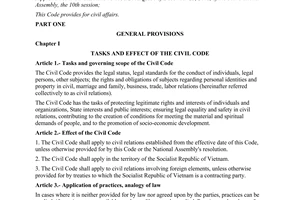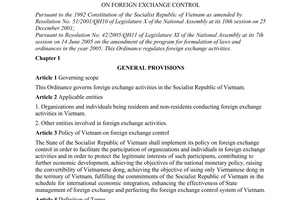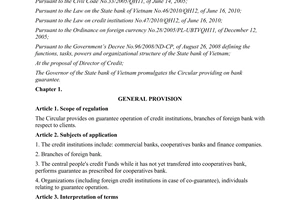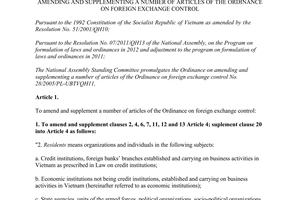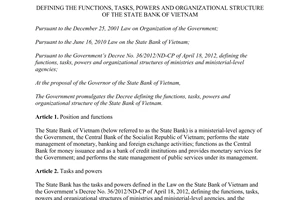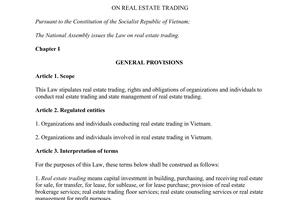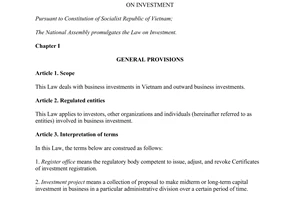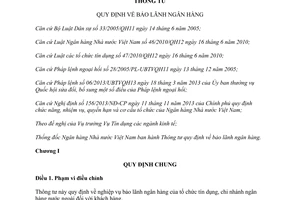Nội dung toàn văn Circular No. 07/2015/TT-NHNN stipulating the Bank guarantee
|
THE STATE BANK
OF VIETNAM |
THE SOCIALIST
REPUBLIC OF VIETNAM |
|
No. 07/2015/TT-NHNN |
Hanoi, June 25, 2015 |
CIRCULAR
STIPULATING THE BANK GUARANTEE
Pursuant to the Civil Code No. 33/2005/QH11 dated June 14, 2005;
Pursuant to the Law on the State Bank of Vietnam No. 46/2010/QH12 dated June 16, 2010;
Pursuant to the Law on Credit Institutions No. 47/2010/QH12 dated June 16, 2010;
Pursuant to the Ordinance No. 28/2005/PL-UBTVQH11 dated December 13, 2005 on foreign exchange;
Pursuant to the Ordinance No. 06/2013/UBTVQH13 of the Standing Committee of the National Assembly dated March 18, 2013 on amendment and supplement to the Ordinance on Foreign Exchange;
Pursuant to the Government's Decree No. 156/2013/NĐ-CP dated November 11, 2013 on defining the functions, tasks, powers and organizational structure of the State Bank of Vietnam;
After considering the request of the Director of the Department of Credits for Economies,
The Governor of the State Bank of Vietnam hereby promulgates the Circular on stipulating the bank guarantee.
Chapter I
GENERAL PROVISIONS
Article 1. Scope of application
This Circular provides for practices of the bank guarantee relationship between credit institutions or foreign bank branches and customers.
Article 2. Applicable entities
1. Credit institutions including commercial banks, cooperative banks and finance companies (except specialized finance companies).
2. Foreign bank branches.
3. Organizations (including foreign credit institutions, if they enter into co-guarantee, counter-guarantee and guarantee confirmation arrangements), and individuals engaged in guarantee transactions.
Article 3. Interpretation of terms
Terms used herein shall be construed as follows:
1. Bank guarantee refers to a type of credit whereby the guarantor undertakes to act on behalf of the obligor to fulfill their financial obligations to the obligee in the event the obligor fails to fulfill or insufficiently fulfill their agreed-upon obligations to the obligee; the obligor must take on their debt obligations and repay the guarantor.
2. Counter guarantee refers to a type of bank guarantee under which the counter-guarantee issuing party agrees to fulfill the financial obligation to the guarantor in the event that the guarantor is called upon to fulfill the financial obligation on behalf of the obligor being the customer of the counter-guarantee issuing party; the obligor must take on their debt obligations and repay the counter-guarantee issuing party.
3. Guarantee confirmation refers to a type of bank guarantee under which the party issuing the bank guarantee confirmation makes a contractual agreement with the obligee to ensure that the guarantor would perform their obligations to the obligee. The party issuing the bank guarantee confirmation shall act on behalf of the guarantor to fulfill their financial obligations in case of the guarantor's nonperformance or insufficient performance; the guarantor must take on their debt obligations and repay the party issuing the bank guarantee confirmation. Meanwhile, the obligor must take on their debt obligations and make repayment to the guarantor.
4. Co-guarantee refers to a loan syndication under which more than 02 (two) credit institutions or foreign bank branches collaborate in giving the bank guarantee; or a credit institution, foreign bank branch and credit institution collaborate in doing so.
5. Guarantor refers to a credit institution or foreign bank branch giving the bank guarantee to the obligor. If the bank guarantee is taking the form of a co-guarantee, counter guarantee or guarantee confirmation, the guarantor shall include a foreign credit institution.
6. Obligor includes a credit institution, foreign bank branch or foreign credit institution, or the individual whom the guarantor or the counter-guarantee issuing party issues the guarantee.
7. Obligee includes a credit institution, foreign bank branch or foreign credit institution, or the individual who is the beneficiary of the bank guarantee issued by the guarantor or the guarantee-confirmation issuing party.
8. Counter-guarantee issuing party refers to a credit institution, foreign bank branch or foreign credit institution giving counter guarantees to the guarantor.
9. Guarantee confirming party refers to a credit institution, foreign bank branch or foreign credit institution giving the guarantee confirmation to the guarantor.
10. Customer refers to a credit institution, foreign bank branch or foreign credit institution, or an individual in accordance with the following provisions:
a) Under the bank guarantee (exclusive of the counter guarantee and guarantee confirmation), customer of the guarantor is termed the obligor;
b) Under the counter guarantee, customer of the guarantor is termed the counter-guarantee issuing party while customer of the counter-guarantee issuing party is termed the obligor;
c) Under the guarantee confirmation, customer of the guarantor is termed the obligor while customer of the guarantee-confirmation issuing party is termed the guarantor.
11. Guarantee issuance agreement refers to the written agreement between the guarantor or the counter-guarantee issuing party or the guarantee-confirmation issuing party and customers as well as other related parties (if applicable) to issue the bank guarantee, counter guarantee and guarantee confirmation to customers.
12. Guarantee commitment refers to the written document issued by the guarantor or the counter-guarantee issuing party or the guarantee-confirmation issuing party which takes one of the following forms:
a) Letter of guarantee refers to the written commitment between the guarantor and the obligee to the guarantor's fulfilling the financial obligation on behalf of the obligor in the event the obligor fails to fulfill or insufficiently fulfill agreed-upon obligations to the obligee.
Under the counter guarantee or the guarantee confirmation, the letter of guarantee shall include the written commitment of the counter-guarantee issuing party to the guarantee, or of the guarantee-confirmation issuing party to the obligee;
b) Guarantee contract refers to the written commitment between the guarantor and the obligee and other related parties (if applicable) to the guarantee’s fulfilling the financial obligation on behalf of the obligor in the event the obligor fails to fulfill or insufficiently fulfill agreed-upon obligations to the obligee.
Under the counter guarantee or guarantee confirmation, the guarantee contract shall be composed of the written committee between the counter-guarantee issuing party and other related parties (if applicable), or between the guarantee-confirmation issuing party and the obligee as well as other related parties (if applicable).
Article 4. Regulations on foreign exchange management in a guarantee transaction
1. Issuance of foreign currency guarantees by credit institutions, foreign bank branches must be relevant to the scope of foreign exchange operations on the domestic and overseas market where each type of credit institution or foreign bank branch is operating.
2. Credit institutions, foreign bank branches shall only be allowed to issue organizations or individuals with foreign currency guarantees given to legal foreign-currency financial obligations in accordance with applicable regulations.
Article 5. Circumstances under which guarantees are not given, restricted and credit limits are determined
When giving guarantees, credit institutions or foreign bank branches must comply with regulations laid down in the Law on Credit Institutions and instructions of the State Bank on circumstances under which guarantees are not given, restricted and credit limits are determined.
Article 6. Determination of the balance of guarantee given to customers
The balance of guarantee given to one customer, or one customer and the related person shall include the balance arising from the issuance of guarantee commitment, counter-guarantee commitment and guarantee-confirmation commitment to such entity.
Article 7. Language use
All documents used in guarantee transactions, including the guarantee issuance agreement, guarantee commitment, should be written in Vietnamese. In respect of the guarantee with foreign elements, related parties are all agreed on use of foreign languages. Where documents are written in foreign languages, they must be translated into Vietnamese and certified by the legal representative of credit institutions or foreign bank branches, enclosing the original copy of documents written in foreign languages upon request of competent authorities.
Article 8. Applied commercial terms and selected dispute resolution
1. Parties involved in a bank guarantee, counter guarantee, guarantee confirmation, or co-guarantee, shall be agreed about applied commercial terms under the provisions of Clause 4 Article 3 of the Law on Credit Institutions.
2. Resolution of a dispute arising from a guarantee transaction shall be governed under the agreement between parties in compliance with legal regulations. As regards the guarantee with foreign elements, contracting parties shall enter into an agreement on applicable laws and dispute-resolving authority (including courts or out-of-country trade arbitration) to resolve any dispute concerning a guarantee transaction in accordance with Vietnam's legislation.
Chapter II
SPECIFIC PROVISIONS
Article 9. Scope of guarantee
The guarantor can give a partial or full guarantee to fulfill the financial obligation to the obligee in favor of the obligor.
Article 10. Requirements imposed on customers
Credit institutions, or foreign bank branches, shall consider and decide issuance of the guarantee, counter guarantee or guarantee confirmation to customers as long as customers meet the following requirements:
1. Have the full capacity to have civil rights or the full capacity to act on those civil rights in accordance with laws.
2. Guaranteed financial obligations must be legal.
3. Obtain the assessment which proves that they have capability of repaying sums that credit institutions or foreign bank branches giving guarantees have paid to fulfill the financial obligations in favor of them.
Article 11. Guarantee provided for non-residential customers
1. Credit institutions, or foreign bank branches, shall be permitted to give guarantees to non-residential organizations provided that the following requirements are met:
a) Customers are enterprises established and operated overseas with contributed capital obtained from Vietnamese enterprises in the form of investments in accordance with Point a, c Clause 1 Article 52 of the Law on Investment 2014, or in the form of other foreign investments in accordance with the host country’s laws;
b) Customers must give an amount as a security deposit in proportion to 100% of the guarantee value;
c) The obligee must be residential individuals.
2. If customers are foreign credit institutions, regulations laid down in this Article shall not be applied.
3. When giving guarantees to non-residential organizations, credit institutions or foreign bank branches must comply with the following regulations:
a) Obtain the license for basic foreign exchange operations conducted in the domestic market (applicable to guarantees given to non-residential entities in Vietnam) and basic foreign exchange operations conducted in international markets (applicable to guarantees given to non-residential entities in overseas countries) from the State Bank;
b) Comply with regulations laid down in Article 126, 127, 128 and 130 of the Law on Credit Institutions as well as instructions on implementation of these regulations adopted by the State Bank on the date of fulfilling guarantee obligations to customers;
c) Set the process for assessing and managing credit risks which include risks to guarantees given to non-residential individuals;
d) In respect of foreign bank branches, comply with regulations laid down in Clause 4 of this Article.
4. Foreign bank branches shall not be allowed to give foreign-currency guarantees to overseas non-residential organizations, except for the following circumstances:
a) Guarantees are given to the obligor in Vietnam on the basis of counter guarantees issued by out-of-country credit institutions;
b) The confirmation proves that guarantee obligations of credit institutions in overseas countries to the obligor in Vietnam are secured.
5. Apart from regulations laid down in this Article, other matters relating to guarantees given to non-residential individuals must be governed under the provisions of this Circular.
Article 12. Guarantees for sale and hire-purchase of future-acquired houses
1. When giving a bank guarantee to the owner of real estate projects developed for the purpose of sale or hire-purchase of future-acquired houses under the provisions of Article 56 of the Law on Real Estate Business, commercial banks must comply with the following regulations:
a) Future-acquired houses must conform to sale or hire-purchase requirements in accordance with regulations laid down in Article 55 of the Law on Real Estate Business;
b) In the contract for sale, purchase or hire-purchase of houses signed between the project owner and purchaser or hire-purchaser, it is agreed that the project owner would indemnify the purchaser or hire-purchaser if the project owner is in breach of their obligations to hand over houses on the right schedule as agreed upon with the purchaser or hire-purchaser;
c) Commercial banks shall assess the project owner's capability of completing the project on the agreed-upon schedule and using down payment sums and others paid by the purchaser or the hire-purchaser to the project owner to serve the right purpose;
d) Commercial banks are permitted by the State Bank to carry out their bank guarantee operations in the license for establishment and operation, or the document stating any amendment or modification to this license;
dd) The guarantee agreement with the project owner, or the guarantee commitment, must conform to regulations laid down in Clause 2, 3 Article 56 of the Law on Real Estate Business adopted in 2014;
e) The commitment to giving guarantees for sale or hire-purchase of future-acquired houses should remain valid at least 30 days after the date of houses being handed over to the purchaser or the hire-purchaser as agreed upon between the project owner and the purchaser or the hire-purchaser.
2. The guarantee contract under the provisions of Article 56 of the Law on Real Estate Business shall be established in the form of a guarantee commitment in accordance with Clause 12 Article 3 and Article 15 hereof.
3. Apart from regulations laid down in Clause 1, 2 of this Article, other matters relating to guarantees for sale and hire-purchase of future-acquired houses must be governed under the provisions of this Circular.
Article 13. Application for issuance of guarantees
1. Application for issuance of guarantees shall be composed of the main documents as follows:
a) Written request for guarantee;
b) Materials related to customers;
c) Materials on guaranteed obligations;
d) Materials on security (if any);
dd) Materials related to other parties (if any).
2. Based on the current status of guarantee transactions performed by credit institutions, foreign bank branches, and the specific characteristics of each customer group, credit institutions, or foreign bank branches, shall provide specific guidance and public disclosure pertaining to required documentation submitted to credit institutions or foreign bank branches for their consideration to extend credits.
Article 14. Credit commitment
1. In order to enter into the guarantee relationship, credit institutions or foreign bank branches and customers must sign the guarantee agreement. In terms of the guarantee given in the form of a counter guarantee, the guarantor shall not be obliged to sign the guarantee agreement with the counter-guarantee issuing party.
2. The guarantee commitment must include the following contents:
a) Applicable regulations;
b) Information about parties in the guarantee relationship;
c) Guarantee obligations;
d) Guarantee sum and currency;
dd) Form of guarantee commitment issuance;
e) Conditions for fulfillment of guarantee obligations;
g) Rights and obligations of parties;
h) Guarantee-issuing fee;
i) Agreement on compulsorily owing debts repaid by other parties, applicable interest rate imposed on the sum paid in favor of other party, debt repayment obligations and duration, once guarantee obligations are required to be fulfilled;
k) Serial numbers, signature date and validity of the agreement;
l) Dispute settlement.
3. Apart from matters stipulated in Clause 2 of this Article, parties shall be entitled to agree on other matters in the guarantee agreement unless this is in breach of regulations laid down in this Circular and legal regulations.
4. Any modification or annulment of agreed matters shall be approved or decided in compliance with legal regulations.
Article 15. Guarantee commitment
1. The guarantee commitment must include the following contents:
a) Applicable regulations;
b) Serial numbers and guarantee commitment form;
c) Information about parties in the guarantee relationship;
d) Date of guarantee issuance, guarantee validity commencement and/or cases in which the guarantee validity begins;
dd) Date of validity termination and/or cases in which the guarantee validity is terminated;
e) Guarantee sum and currency;
g) Guarantee obligations;
h) Conditions for fulfillment of guarantee obligations;
i) Application for fulfillment of guarantee obligations;
k) Approaches to checking the authenticity of the guarantee commitment.
2. Apart from matters stipulated in Clause 1 of this Article, the guarantee commitment may include other matters relevant to the guarantee commitment, and in compliance with regulations laid down in this Circular and applicable laws.
3. Any modification or annulment of agreed-upon matters shall be approved in compliance with the guarantee agreement and applicable laws.
4. Credit institutions, or foreign bank branches, shall take into account matters agreed upon in the guarantee agreement or guarantee commitment stipulated in this Circular to design, print and issue the guarantee commitment template in response to the guarantee form and category which are consistently applied to the entire system of these credit institutions or foreign bank branches. Credit institutions, or foreign bank branches, must issue internal regulations on the process, responsibility for such design, printing, issuance and use of the guarantee commitment template in order to ensure the safety and compliance with legal regulations.
5. Guarantee commitments issued through the international inter-bank communication network, credit institutions or foreign bank branches, shall take the form and follow the process of the guarantee commitment issuance accepted by the international inter-bank communication network. Credit institutions, or foreign bank branches, must issue the procedures for monitoring or administration of guarantee issuance operations to be applied in this circumstance in order to ensure the safety and efficiency.
Article 16. Authority to sign the guarantee agreement or the guarantee commitment
1. The guarantee agreement, or the guarantee commitment, should be signed by legal representatives or authorized individuals of credit institutions or foreign bank branches.
2. The delegation of authority to sign the guarantee agreement, or the guarantee commitment, must be documented and relevant to legal regulations.
Article 17. Customer performance guarantee
1. Credit institutions, or foreign bank branches, shall agree with related parties on whether a guarantee for obligations to repay the sum paid in favor of other party is needed if they are required to fulfill their guarantee obligations.
2. Credit institutions, or foreign bank branches, shall stipulate the specific principles and conditions under which each guarantee method is applied or not in compliance with legal regulations on guarantee relationships, guarantee transactions, and in accordance with the internal regulations adopted by these credit institutions or foreign bank branches.
Article 18. Guarantee-issuing fee
1. Credit institutions, or foreign bank branches, shall agree on the guarantee-issuing fee amount paid to customers. In case of a counter guarantee or guarantee confirmation, the guarantee-issuing fee amount shall be agreed upon by parties on the basis of the guarantee-issuing fee amount approved by the obligor.
2. In respect of the co-guarantee, on the basis of agreement on the co-guarantee contribution ratio and fee amounts collected from the obligor, parties involved in the co-guarantee shall agree on the guarantee-issuing fee paid to each party.
3. If credit institutions, or foreign bank branches, issue their guarantee for a joint obligation, they are required to agree with each customer about the fee amount paid on the basis of the equivalent joint obligation of each customer, unless otherwise agreed upon by parties.
4. If the guarantee currency is foreign one, parties shall agree on collecting the guarantee-issuing fee by accepting that foreign currency or converting that foreign currency into Vietnam at the sell rate defined on the fee collection or fee collection notification date.
5. Parties can agree on any adjustment made to the guarantee-issuing fee.
Article 19. Validity period of the guarantee commitment or agreement
1. The validity period of the guarantee commitment shall last from the date of issuance of the guarantee commitment, or from any date after the date of issuance of the guarantee commitment as agreed upon between contracting parties to the date on which the validity of guarantee obligations is terminated under the provisions of Article 23 hereof.
2. The validity period of the guarantee agreement shall be agreed upon by parties but equal at least the validity period of the guarantee commitment.
3. If the expiry date of the guarantee commitment or agreement expires correspond to days-off or national holidays, it shall be shifted to the consecutive working day.
4. The extension of the validity period of the guarantee commitment shall be agreed upon by parties in conformity with the guarantee commitment.
Article 20. Exemption from liability for guarantee obligations
1. Where the obligee exempts the guarantor/ guarantee confirmation issuing party from liability to fulfill guarantee obligations, the obligee and/or related parties are still required to fulfill the obligations agreed upon with the obligee, unless otherwise agreed upon by parties, or to fulfill joint obligations in accordance with laws.
2. If one or several co-guarantee issuer(s) are exempted from liability to fulfill their guarantee obligations, other parties are required to continue to fulfill their agreed-upon obligations, unless otherwise agreed upon by parties.
Article 21. Fulfillment of guarantee obligations
1. In order to request fulfillment of guarantee obligations, the obligee must send a written request for fulfillment of guarantee obligations, enclosing required documentation stipulated in the guarantee commitment, to the guarantor. The written request for fulfillment of guarantee obligations shall be deemed valid only if it is received within the guarantor’s working periods and within the validity period of the guarantee commitment. If the written request for fulfillment of guarantee obligations is sent in the form of a registered mail through the public postal network, the date on which the guarantor receives this written request is the date on which the receipt of that registered mail is confirmed.
2. Fulfillment of guarantee obligations:
a) With regard to the bank guarantee (except for the counter guarantee or guarantee confirmation):
Not later than 5 working days from the date on which the guarantor has received the valid request for fulfillment of guarantee obligations as stipulated in Clause 1 of this Article, the guarantor shall be responsible for correctly and sufficiently fulfilling agreed-upon guarantee obligations to the obligee, and concurrently debit a sum paid in favor of the obligor to the mandatory lending account as well as notify the obligor of this. The obligor shall be obliged to reimburse a full sum paid by the guarantor on their behalf and an interest amount under the provisions of Clause 3 of this Article.
b) With regard to the counter guarantee:
Not later than 5 working days from the date on which the guarantor has received the valid request for fulfillment of guarantee obligations as stipulated in Clause 1 of this Article, the guarantor shall be responsible for correctly and sufficiently fulfilling agreed-upon guarantee obligations to the obligee.
After fulfillment of guarantee obligations, the guarantor shall request in writing the counter-guarantee issuing party to fulfill their agreed-upon guarantee obligations, enclosing documentation stipulated in the counter-guarantee agreement. The request for fulfillment of counter-guarantee obligations shall be deemed legitimate only if the counter-guarantee issuing party receives it within their working period and the validity period of the counter-guarantee commitment. If the request for fulfillment of counter-guarantee obligations is sent in the form of a registered mail through the public postal network, the date on which the counter-guarantee issuing party has received this request shall correspond to the date on which receipt of the registered mail is confirmed.
Not later than 5 working days from the date on which the counter-guarantee issuing party has received the request for fulfillment of guarantee obligations, the counter-guarantee issuing party shall be responsible for correctly and sufficiently fulfilling agreed-upon guarantee obligations to the guarantor, and concurrently debit a sum paid in favor of the obligor to the mandatory lending account as well as notify the obligor of this. The obligor shall be obliged to reimburse a full sum paid by the counter-guarantee issuing party on their behalf and pay an interest amount under the provisions of Clause 3 of this Article.
If the counter-guarantee issuing party fails to sufficiently fulfill agreed-upon guarantee obligations to the guarantor, the guarantor shall debit a sum paid on their behalf to the mandatory lending account and notify the counter-guarantee issuing party of this. The counter-guarantee issuing party shall be responsible for reimbursing a full sum paid by the guarantor on their behalf and pay an interest amount under the provisions of Clause 3 of this Article.
c) With regard to the guarantee confirmation:
Not later than 5 working days from the date on which the guarantor has received the valid request for fulfillment of guarantee obligations as stipulated in Clause 1 of this Article, the guarantor shall be responsible for correctly and sufficiently fulfilling agreed-upon guarantee obligations to the obligee, and concurrently debit a sum paid in favor of the obligor to the mandatory lending account as well as notify the obligor of this. The obligor shall be obliged to reimburse a full sum paid by the guarantor on their behalf and pay an interest amount under the provisions of Clause 3 of this Article.
If the guarantor fail to fulfill or insufficiently fulfill agreed-upon obligations to the obligee, the obligee shall send the written request for fulfillment of guarantee obligations, enclosing documentation agreed upon in the guarantee commitment, to the guarantee-confirmation issuing party. The request for fulfillment of guarantee obligations shall be deemed legitimate only if the guarantee-confirmation issuing party receives it within their working period and the validity period of the guarantee commitment. If the request for fulfillment of counter-guarantee obligations is sent in the form of a registered mail through the public postal network, the date on which the guarantee-confirmation issuing party has received this request shall correspond to the date on which receipt of the registered mail is confirmed.
Not later than 5 working days from the date on which the guarantee-confirmation issuing party has received the request for fulfillment of guarantee obligations, the guarantee-confirmation issuing party shall be responsible for correctly and sufficiently fulfilling agreed-upon guarantee obligations to the obligee, and concurrently debit a sum paid in favor of the guarantor to the mandatory lending account as well as notify the guarantor of this. The guarantor shall be obliged to reimburse a full sum paid by the guarantee-confirmation issuing party on their behalf and pay an interest amount under the provisions of Clause 3 of this Article, concurrently request the obligor to take on their debt obligations and repay debts to the guarantor.
3. The party making payment in favor of other party shall decide mandatory lending tenor, debt repayment due date and applicable interest rate on the sum paid by other party as agreed upon in the guarantee commitment. The applicable interest rate imposed on the sum paid by other party shall be agreed upon by parties in the guarantee agreement but restricted to less than 150% of the common loan interest rate imposed on loans with the equivalent loan tenor extended by such credit institutions or foreign bank branches.
4. In case of refusal to fulfill guarantee obligations, not later than 5 working days from receipt of the request for fulfillment of guarantee obligations, the refusing party must send a written response in which the reasons for such refusal must be clearly stated.
5. In case the sum is paid by other party in foreign currency, credit institutions or foreign bank branches shall debit that foreign-currency sum to the mandatory lending account.
Article 22. Relationship between the guarantee commitment and the contract under which contractual obligations are guaranteed
1. If the contract under which contractual obligations are guaranteed is void but parties have not executed the contract yet, the guarantee commitment shall be terminated; if a part or the whole of the contract under which contractual obligations are guaranteed has been executed, the guarantee commitment shall not be terminated, unless otherwise agreed.
2. If the contract under which contractual obligations are guaranteed is abolished or unilaterally terminated but parties have not executed the contract yet, the guarantee commitment shall be terminated; if a part or the whole of the contract under which contractual obligations are guaranteed has been executed, the guarantee commitment shall not be terminated, unless otherwise agreed.
3. In case the guarantee commitment is not terminated under the provisions of Clause 1, 2 of this Article, the obligee shall be entitled to request the guarantor to fulfill their financial obligations to discharge the reimbursement obligations of the obligor.
Article 23. Termination of guarantee obligations
Guarantee obligations shall be terminated under the following circumstances:
1. The obligor’s obligations are discharged.
2. The guarantee obligations have been fulfilled in accordance with the guarantee commitment.
3. The guarantee is cancelled or replaced by other guarantee measures.
4. The guarantee commitment has ended its validity.
5. The obligee has been exempted fro liability to fulfill guarantee obligations to the guarantor.
6. Parties agree to do this.
7. In accordance with regulations laid down in Clause 1 and 2 of Article 22.
8. Guarantee obligations shall be terminated under other circumstances in accordance with legal regulations.
Article 24. Co-guarantee
1. Co-guarantee principles, requirements or procedures shall be governed under the provisions of this Circular, the State Bank’s regulations on syndicated loans of credit institutions or foreign bank branches extended to customers and relevant legal regulations.
2. Co-guarantee parties shall assume joint responsibility to fulfill guarantee obligations unless otherwise agreed. Where central credit institutions or foreign bank branches are required to fulfill guarantee obligations, involved parties shall be responsible for paying these credit institutions or foreign bank branches a sum equivalent to the agreed-upon co-guarantee contribution ratio.
Article 25. Guarantee for a joint obligation
Credit institutions or foreign bank branches, when issuing their guarantees for joint obligations, must be governed under the terms and conditions of the joint contract under which parties are bound to their contractual rights and obligations.
Article 26. Internal regulations of credit institutions or foreign bank branches on guarantees
1. Based on regulations laid down in this Circular and other relevant laws, credit institutions or foreign bank branches shall be obliged to adopt internal regulations on giving guarantees to residential organizations or individuals, and non-residential organizations in compliance with applicable credit regulations in which the guarantee-issuing assessment and approval consideration should be defined.
2. Credit institutions or foreign bank branches shall send 01 (one) copy of these internal regulations on guarantee-related practices to the State Bank (Department of credit for economies) not later than 5 working days from the issuance, amendment or revision date.
Article 27. Rights of the guarantor
1. Accept or refuse the request for guarantee issuance.
2. Request the guarantee-confirmation issuing party to provide their guarantee confirmation for the obligor.
3. Request the obligor or the counter-guarantee issuing party and other relevant party to provide materials or information about the assessment to issue guarantees for collateral (if any).
4. Request the obligor or the counter-guarantee issuing party to take proper measures to secure their guarantee obligations (if any).
5. Examine and control the financial health of customers within the validity period of the guarantee.
6. Collect and adjust the guarantee-issuing fee; impose or adjust the interest rate or break fee rate.
7. Refuse to fulfill guarantee obligations when the guarantee commitment expires, or documentation submitted to request fulfillment of guarantee obligations fail to meet requirements stipulated in the guarantee commitment, or it is established that submitted documents are not genuine.
8. Request the counter-guarantee issuing party to fulfill their agreed-upon obligations.
9. Record a debit to the account of the obligee (applicable to the bank guarantee) or the counter-guarantee issuing party (applicable to the guarantee given on the basis of the counter guarantee) immediately after guarantee obligations have been fulfilled; request the obligor or the counter-guarantee issuing party to reimburse a stipulated sum paid by the guarantor.
10. Request other co-guarantee issuing parties to reimburse a sum paid in favor of the obligor in case the central party fulfills their guarantee obligations in the co-guarantee relationship.
11. Treat collateral under the agreement and legal regulations.
12. Transfer their rights and obligations to other credit institutions or foreign bank branches under the agreement between involved parties in compliance with legal regulations.
13. File a lawsuit in accordance with laws if the obligor or the counter-guarantee issuing party is in breach of their agreed-upon obligations.
14. Exercise other rights under the agreement between parties in conformity with legal regulations.
Article 28. Rights of the counter-guarantee issuing party
1. Accept or refuse the request for counter-guarantee issuance.
2. Request the guarantor to issue the guarantee for their customer’s obligations to the obligor.
3. Request customers to provide materials or information about the assessment to issue counter guarantees and the assessment of collateral (if any).
4. Request customers to take necessary measures to ensure that their guarantee obligations are fulfilled (when appropriate).
5. Examine and control the financial health of customers within the validity period of the guarantee.
6. Collect and adjust the guarantee-issuing fee; impose or adjust the interest rate.
7. Refuse to fulfill counter-guarantee obligations when the guarantee commitment expires, or documentation submitted to request payments fail to meet requirements stipulated in the guarantee commitment, or it is established that submitted documents are not genuine.
8. Record a debit to the account of the obligor immediately after counter-guarantee obligations to the guarantor have been fulfilled, and request the obligor to reimburse the sum paid by the counter-guarantee issuing party to fulfill their counter-guarantee obligations on behalf of the guarantor as agreed upon in the counter-guarantee commitment.
9. Treat collateral put up by the obligor under the agreement and legal regulations.
10. File a lawsuit in accordance with laws if the obligor or the guarantor is in breach of their agreed-upon obligations.
11. Transfer their rights and obligations to other credit institutions or foreign bank branches under the agreement between involved parties in compliance with legal regulations.
12. Exercise other rights under the agreement between parties in conformity with legal regulations.
Article 29. Rights of the guarantee-confirmation issuing party
1. Accept or refuse the request for guarantee confirmation issuance.
2. Request customers to provide materials or information about the guarantee assessment and the evaluation of collateral (when applicable).
3. Request customers to take necessary measures to ensure that their guarantee obligations are fulfilled (when appropriate).
4. Agree with the obligor and/or customers about guarantee confirmation obligations, processes and procedures for reimbursement made by the guarantee confirmation issuing party to fulfill their obligations to the obligee.
5. Collect and adjust the guarantee-issuing fee; impose or adjust the interest rate.
6. Examine and control the financial health of customers within the validity period of the guarantee.
7. Record a debit to the account of the guarantor immediately after guarantee-confirmation obligations have been fulfilled, and request the guarantor to reimburse the sum paid by the guarantee-confirmation issuing party in favor of the guarantor as agreed upon in the commitment.
8. Treat collateral put up by the guarantor or the obligor under the agreement and legal regulations.
9. File a lawsuit in accordance with laws if the guarantor is in breach of their agreed-upon obligations.
10. Transfer their rights and obligations to other credit institutions or foreign bank branches under the agreement between involved parties in compliance with legal regulations.
11. Refuse to fulfill guarantee obligations when the guarantee commitment expires, or documentation submitted to request payments fail to meet requirements stipulated in the guarantee commitment, or it is established that submitted documents are not genuine.
12. Exercise other rights under the agreement between parties in conformity with legal regulations.
Article 30. Obligations of the guarantor, the counter-guarantee issuing party and the guarantee-confirmation issuing party
1. Assume their responsibility to provide information or materials on authority to issue the guarantee commitment to involved parties; fulfill their guarantee obligations upon request in compliance with regulations laid down in the guarantee commitment.
2. Fulfill guarantee obligations in a correct and sufficient manner as prescribed in Article 21 hereof.
3. Reimburse a full amount of collateral (if any) and other related materials to the guarantor when discharging agreed-upon guarantee obligations, unless otherwise agreed.
4. Not later than 10 (ten) working days from receipt of written complaints from the obligor on the reasons for refusal to fulfill guarantee obligations, send a written response to the petitioner.
5. Store guarantee applications in accordance with legal regulations.
6. Provide guidance for the obligor to check and confirm the authenticity of the issued guarantee commitment.
7. Fulfill other obligations under the agreement between parties in conformity with legal regulations.
Article 31. Rights and obligations of the obligor
1. The obligor shall exercise the following rights:
a) Refuse requests of the guarantor, the counter-guarantee issuing party and the guarantee-confirmation issuing party which are in breach of terms and conditions set in the guarantee agreement or commitment;
b) Request the guarantor, the counter-guarantee issuing party to obey their agreed-upon obligations or liabilities;
c) File a lawsuit in accordance with laws if the guarantor or the counter-guarantee issuing party is in breach of their agreed-upon obligations;
d) Exercise their rights or fulfill their obligations in accordance with laws when involved parties transfer their guarantee rights and obligations to guarantee items;
dd) Check the authenticity of the guarantee commitment;
e) Exercise other rights under the agreement between parties in conformity with legal regulations.
2. The obligor shall fulfill the following obligations:
a) Provide correct, sufficient and genuine information or materials on guarantee items and assume legal liabilities for the accuracy, authenticity and sufficiency of provided information or materials;
b) Fulfill agreed-upon obligations or liabilities and adhere to terms and conditions stipulated in the guarantee agreement in a sufficient and timely manner;
c) Repay the guarantor, the counter-guarantee issuing party a sum paid by these entities to fulfill their obligations stipulated in the guarantee agreement or commitment between parties as well as other costs incurred from fulfillment of guarantee obligations;
d) Be subjected to inspection or supervision of the guarantor, the counter-guarantee issuing party as to the process of fulfillment of guaranteed obligations. Be obligated to report on the operating condition concerning the guarantee transaction to the guarantor or the counter-guarantee issuing party;
dd) Collaborate with the guarantor, the counter-guarantee issuing party and other relevant parties in treating collateral (if available);
e) Fulfill other obligations under the agreement between parties in conformity with legal regulations.
Article 32. Rights and obligations of the obligee
1. Rights of the obligee:
a) Request the guarantor, the guarantee-confirmation issuing party to fulfill guarantee obligations;
b) Request the guarantor, the guarantee-confirmation issuing party to fulfill obligations and liabilities agreed upon in the guarantee commitment;
c) File a lawsuit in accordance with laws if the guarantor or the guarantee-confirmation issuing party is in breach of their agreed-upon obligations;
d) Check the authenticity of the guarantee commitment;
dd) Transfer their rights and obligations to other entities under the agreement between involved parties in conformity with legal regulations;
e) Exempt the guarantor, the guarantee-confirmation issuing party from liability to fulfill guarantee obligations;
g) Exercise other rights under the agreement between parties in conformity with legal regulations.
2. Obligations of the obligee
a) Fulfill agreed-upon guarantee obligations and ensure conformity with terms and conditions set in the guarantee commitment;
b) Notify the guarantor, the guarantee-confirmation issuing party and other related parties of any sign or act of violation committed by the obligor;
c) Fulfill other obligations under the agreement between parties in conformity with legal regulations.
Chapter III
REPORTING AND IMPLEMENTATION
Article 33. Accounting record, reporting information
1. Credit institutions or foreign bank branches shall be obliged to make accounting records and keep track of all guarantee items arising in accordance with applicable regulations.
2. Credit institutions or foreign bank branches shall report on the current guarantee performance in accordance with regulations on the statistical reporting system of the State Bank.
Article 34. Responsibilities of the State Bank’s affiliates
1. Responsibilities of the Department of Credits for Economies:
a) Act as the focal point in receiving the document on internal regulations on guarantee practices from credit institutions, foreign bank branches as stipulated in Article 26 hereof; monitoring and aggregating the current status of guarantee performance of credit institutions or foreign bank branches;
b) Act as the focal point in aggregating, announcing the list of commercial banks, as prescribed in Clause 1 Article 56 of the Law on Real Estate Business adopted in 2014, which are eligible ones in accordance with regulations laid down in Point d Clause 1 Article 12 hereof on the website of the State Bank;
c) Act as the focal point in handling any difficulty arising from guarantee practices.
2. Responsibilities of the Bank Supervision and Inspection Agency:
a) Preside over, collaborate with relevant organizations in examination, inspection and supervision of guarantee practices of credit institutions, foreign bank branches as well as take punitive actions within their jurisdiction;
b) Collaborate with the Department of Credits for Economies in announcing the list of commercial banks in accordance with regulations laid down in Point b Clause 1 of this Article.
3. The Department of Finance and Accounting shall be responsible for providing guidance for credit institutions or foreign bank branches to implement the accounting record regulations applied to guarantee-related transactions under the provisions of this Circular.
4. The Department of Foreign Exchange shall be responsible for providing instructions on foreign exchange management with respect to the fulfillment of guarantee obligations and collection of non-residential guarantee debts carried out by credit institutions or foreign bank branches.
5. Branches of the State Bank of centrally-affiliated cities and provinces where the Department of Bank Supervision and Inspection is not present shall be responsible for carrying out supervision, inspection and examination of the compliance of credit institutions, foreign bank branches with this Circular within their jurisdiction.
Chapter IV
IMPLEMENTARY PROVISIONS
Article 35. Transitional provisions
Guarantee agreements or commitments signed and brought into effect before the effective date of this Circular shall continue to be implemented as agreed upon by parties until guarantee obligations are terminated. Any amendment or modification to these guarantee agreements or commitments shall be allowed only if it is relevant to regulations laid down in this Circular.
Article 36. Effect
1. This Circular shall come into force from August 9, 2015.
2. This Circular shall replace the Circular No. 28/2012/TT-NHNN of the State Bank dated October 3, 2012 on the bank guarantee.
Article 37. Implementation
The Chief of the Ministry Office, the Director of the Department of Credits for Economies, the Head of relevant affiliates of the State Bank, the Director of the State Bank Branches of centrally-affiliated cities and provinces, the President of the Board of Directors, the President of the Board of Members and the General Director (Director) of credit institutions, foreign bank branches, shall be responsible for enforcing this Circular.
|
|
PP. THE
GOVERNOR |
------------------------------------------------------------------------------------------------------
This translation is made by LawSoft and
for reference purposes only. Its copyright is owned by LawSoft
and protected under Clause 2, Article 14 of the Law on Intellectual Property.Your comments are always welcomed
